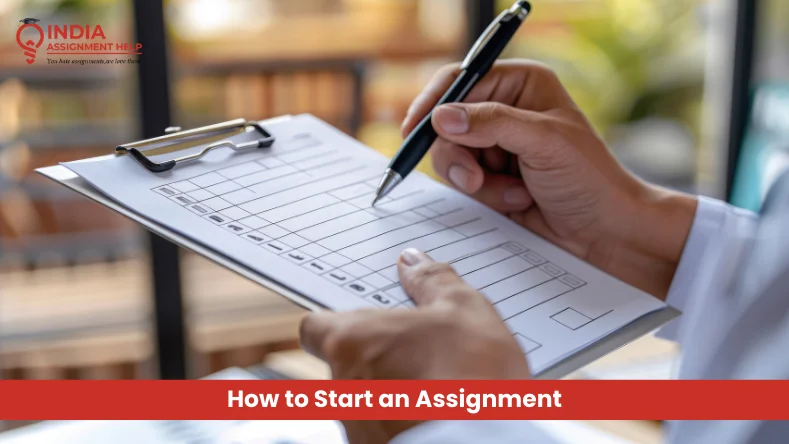Thinking of How to Start an Assignment? Here are a Few Suggestions

Assignments are a fundamental part of academic life. Whether you are in high school, college, or university, knowing how to start an assignment effectively can set the stage for success. This guide will walk you through the initial steps and tips on how to write assignments, the appropriate assignment format, and critical assignment writing tips to help you craft a compelling, well-structured piece of work.
Understanding How to Write an Assignment
In order to understand how to write an assignment efficiently and precisely, follow the below-mentioned instructions:
a. Read the Instructions Carefully
The first step in starting any assignment is to read the instructions provided by your teacher or professor thoroughly. This includes understanding the topics, the scope of the assignment, the word count, the assignment format, and its deadline. Moreover, you must pay attention to specific guidelines about referencing styles and the types of sources to use.
b. Clarify Doubts
If you have any doubts about the assignment, do not hesitate to ask your teacher or professor for clarification. Additionally, taking assignment writing tips upfront will be better than making assumptions that can lead to mistakes.
c. Choose the Topic
In case your assignment allows for a choice of topic, select one that interests you and aligns with the objectives that need to be accomplished.
d. Conduct Preliminary Research
Before writing, conduct preliminary research to collect data about the selected topic. You can also review a student assignment sample format to know how to make an assignment. This will help you frame your argument or thesis and identify the key points to cover.
e. Create an Outline
An outline is a roadmap for your assignment. It helps you to organise your thoughts and structure your work logically. A typical outline includes
- Introduction: Brief overview of the topic of your thesis statement.
- Body Main: points arguments, each with supporting evidence.
- Conclusion: Summarise the information conveyed in the main body.
After Knowing How to Write an Assignment, Understand What to Write
An assignment must be appropriately completed, starting with an introduction and ending with the conclusion. Still Confused? Refer below pointers:
a. Introduction
The introduction should start with sentences that gather the reader's attention. Additionally, the assignment format should be precise and include hints about the main body and conclusion, encouraging readers to read ahead.
b. Develop the Body
Writing the main body is crucial in every assignment, where you present the key points and supporting evidence. Each paragraph should focus on a topic. Use relevant examples, quotes and data to support your argument.
c. Write the Conclusion
The conclusion should provide a final perspective on the topic and suggest any further research or implications, if applicable.
d. Use Proper Assignment Format
Adhering to the specified formats is very important. Standard formats include APA, MLA, Chicago, Harvard, etc. Ensure to follow all the heading subheadings guidelines and margin fund size referencing style. You can take reference from the passed-out student’s assignment sample format. Proper formatting increases the readability and professionalism of your work.
Completed with Writing? Proofread It
After crafting the assignment, you should review and proofread the complete work. Want to know how to do it? Reach below:
a. Spare Some Time
Once you are done writing, spare some time before revising. This will help you read the work with fresh eyes and a clear mind.
b. Review Revise
Review your assignment critically. Look for any gaps in your argument's clarity of expression rheological flow. Revise sentences to conciseness clarity.
c. Proofread for Errors
Proofread your assignment to catch each grammatical spelling and punctuation error. Reading your work a lot can help you identify a walk-freezing run-on sentence.
A few Tips on How To Write Assignment
Need some tips to craft the assignment? Here are a few of them:
a. Time Management
Give sufficient time for each stage of the writing process and assignment format. Set deadlines for completing the research writing and revising phrases to avoid last-minute wishes.
b. Stay Organised
Keep all your research material notes drafts organised. Use folders of digital tools to manage your resources effectively.
c. Stay Original
Maintain academic integrity by avoiding plagiarism. Always cite your sources properly and present your analysis interpretation.
d. Practice Regularly
Like any skill, assignment writing improves with practice. Regularly engage in writing activities to increase your writing style, vocabulary, and critical thinking skills.
Conclusion
Starting an assignment may seem daunting, but it can become a manageable, enjoyable task with the right approach and mindset. Remember, the key to success in full assignment writing is through preparation, clear organisation, and diligent revision. Do you still need assistance? Reach out to India Assignment Help experts.
FAQs
a. How do I choose a topic for my assignment?
Select a topic that aligns with the assignment objectives.
b. What should I include in the introduction?
The introduction should have a hook, background information a clear thesis statement.
c. How do I structure the body of my assignment?
Each paragraph should focus on the topic sentence and supporting evidence.
d. What is the purpose of the conclusion?
The conclusion summarises your findings and suggests further research or implications.





